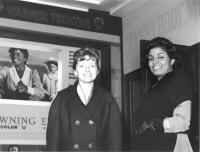Both women were fascinated by the creative atmosphere at Mackinac - the writing, music, theatre - and above all by the idea that their talents could be used constructively. They stayed and stayed, in spite of long-distance calls from their agents. Buchman saw in them what at first they would not see in themselves, a dramatisation of the answer to America's racial problems. Muriel Smith, a black American, had been brought up in Harlem and she and her mother had known real deprivation. Mrs Smith often talked of the red-letter day when she could finally afford to buy her daughter a pair of stockings. Ann Buckles was a striking blonde at the beginning of her career and came from the Southern state of Tennessee. As the weeks went on they began to sort out the many factors which divided them and to become friends.
Alan Thornhill and Cece Broadhurst decided to write a musical for them. It was based on the life story of Mary McLeod Bethune, the daughter of slaves who, starting with only one dollar in her purse, translated her determination that her people should have the chance of a good education into the first American college founded by a black, and finally became a special adviser to President Roosevelt. Meeting Moral Re-Armament some years earlier she had said to Buchman, 'To be a part of this great uniting force is the crowning experience of my life.' So they called the play The Crowning Experience.

Another long-term drama ran concurrently, in the lives of the two actresses. Once, when some recording with a symphony orchestra was being done for the subsequent film, they were sharing a hotel room. 'Muriel had this glorious voice,' says Ann Buckles. 'When she sang the orchestra lit up, but when I sang they looked glum, perhaps because American musical comedy was new to them. Then I would go back to the hotel, and have to listen to Muriel humming and singing all night long. One night I finally screamed, "Shut up!" I was shocked at what I had done. Muriel just said, "Would you have told me to shut up sooner if I'd been white?" She had put her finger on my patronizing attitude. That was the end of conversation that night. Next morning Frank sent for us, and we were petrified because we had been yelling. He said, "We have a South African judge and a black African leader returning to South Africa to get Freedom through the Board of Censors. Will you come to lunch and tell us how you found unity?" Muriel and I retired shamefaced and began to be honest.'
When The Crowning Experience opened in Atlanta, Georgia, in January 1958 11,000 people saw it during the first weekend. After the first night the local radio announced, as though astonished, 'There were no incidents in the Civic Auditorium.' During the first performances plain-clothes police had formed part of the audience, but they soon realised that their presence was unnecessary and stopped coming. Then the play moved from the Civic Auditorium to the Tower Theater, where the manager provided equal seating for white and black, something which had never happened before in Atlanta. 'I came in trepidation and left in exaltation,' he said after the first performance. The wife of a white minister commented, 'For years we have been listening to the tick of a bomb waiting for it to explode in our city. Now we are listening to the tick of the Holy Spirit. You have come at the right time.'10
499
Photo: The Broadway actresses, Muriel Smith (right) and Ann Buckles, played the leads in the musical The Crowning Experience, which spearheaded Buchman's work for racial reconciliation in the US, 1957-58.
©Arthur Strong/MRA Productions